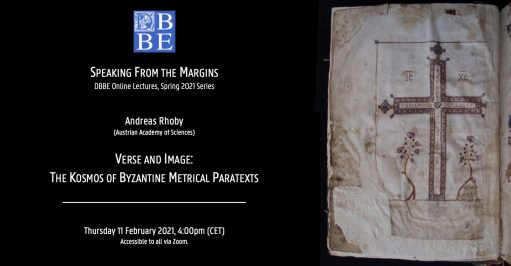The second lecture in the online seminar series ‘Novel Echoes: Ethiopian and Babylonian Stories in Byzantium and Beyond’ will be given by Professor Silvia Montiglio on ‘The popularity of Heliodorus among Byzantine critics and readers’.
Please email evelien.bracke@ugent.be for the link.
See www.novelsaints.ugent.be for more information.
The third seminar in the online series ‘Novel Echoes: Ethiopian and Babylonian Stories in Byzantium and Beyond’ is by Dr Ellen Söderblom Saarela (UGent) on ‘She must write her self, she did write her self: Hysmine’s voice from within the wrong’.
Please email evelien.bracke@ugent.be for the zoom link.
The final lecture in the online seminar series ‘Novel Echoes: Ethiopian and Babylonian Stories in Byzantium and Beyond’ will be given by Dr Nunzio Bianchi (Università degli studi di Bari Aldo Moro) on ‘From Babylon to Byzantium: Iamblichus’ novel and its reception’
Please email evelien.bracke@ugent.be for the link.
See www.novelsaints.ugent.be for more information.
The fourth lecture in the online seminar series ‘Novel Echoes: Ethiopian and Babylonian Stories in Byzantium and Beyond’ will be given by Paolo Brusa (Freie Universität Berlin) on ‘From wandering to destitution: a shift in Heliodoran peregrinatio in 17th century Spain’
Please email evelien.bracke@ugent.be for the link.
See www.novelsaints.ugent.be for more information.
The first lecture in the online seminar series ‘Novel Echoes: Ethiopian and Babylonian Stories in Byzantium and Beyond’ will be given by Dr Benedek Kruchio (Universität Regensburg) on ‘Heliodorus’s Aethiopica and early Christian hermeneutics: a “historically informed” approach’.
’.
Please email evelien.bracke@ugent.be for the link.
See www.novelsaints.ugent.be for more information.
On Thursday 11 February, Andreas Rhoby (Austrian Academy of Sciences) will inaugurate the first DBBE Speaking From the Margins-lecture series. He will dedicate his presentation to the memory of Wolfram Hörandner, professor emeritus of Byzantine literature at the University of Vienna, who has recently passed away.
Abstract
The production of verse in Byzantium was immense. What is left represents only the tip of the iceberg of the poetic production of Byzantine intellectuals. Writing verses (as opposed to writing prose) was not necessarily considered to be something special, as is the case in our modern conception of literature. In Byzantium, a considerable part of the literary production belongs to the genre of so-called paratexts, i.e. texts that accompany or refer to a main text. These paratexts, a huge amount of them composed in verse, occur in manuscripts (often in connection with images) but also as inscriptions. For example, verses accompanying portraits in fresco painting are also paratexts insofar as they accompany an image which represents the center of the composition.
In my presentation, I will discuss the interaction of images and accompanying verses in manuscripts, on fresco paintings and on other media. My lecture will reveal how carefully planned was the production and the layout of images with verses in manuscripts and other media, and how one medium influenced the other. The kosmos of Byzantine metrical paratexts is as wide and colorful as the kosmos (‘adornment’) of images and illuminations and their accompanying verses.
Practical information
Date & time: Thursday 11 February 2021, 4:00pm (UTC+1, CET)
No registration required. The lecture is freely accessible via Zoom: https://ugent-be.zoom.us/j/98880354185?pwd=YnErNHlCWkZxTk43eVlWY0JBNnpPUT09.
- Meeting ID: 988 8035 4185
- Passcode: 2Mg6Uvdt

In het vorige schooljaar had onze afdeling een interactief onderzoeksfestival gepland voor het vierde, vijfde en zesde middelbaar. Omwille van de lockdown is het evenement toen jammer genoeg niet kunnen doorgaan. Dit schooljaar organiseren we ons festival daarom onmiddellijk coronaproof. Door middel van online workshops waaraan klasgroepen interactief kunnen deelnemen in de vorm van quizzes en breakout rooms (met begeleiding door studenten), laten we leerlingen kennis maken met de inhoud van universitair onderzoek, en doorprikken we op die manier graag mythes over literair en taalkundig onderzoek.
Leerlingen van het vierde, vijfde en zesde middelbaar kunnen deelnemen aan vijf interactieve workshops in de loop van de dag, gebaseerd op het onderzoek dat we binnen onze afdeling dagelijks uitvoeren. Het evenement wordt normaal gezien door Professor Mary Beard (University of Cambridge) geopend.
Je kan hier inschrijven.
Lezing in het kader van de emeritaatsviering voor em. prof. dr. Gunnar De Boel.
Op 17 februari zal niet de vraag “waar komt God vandaan?” centraal staan, maar “waar komt het woord voor ‘god’ vandaan?”. Tijdens de lezing zal ik me immers in de eerste plaats toespitsen op het Griekse woord θεός, het Latijnse deus en het Nederlandse god zelf. Enerzijds zal ik jullie vertellen waar de woorden vandaan komen, of met andere woorden, wat die termen voor ‘god’ betekenden alvorens ‘god’ te beduiden. Zo zal ik me richten op de oorspronkelijke betekenis van de stam van θεός, die onder meer nog kan worden teruggevonden in de Latijnse en Griekse woorden fānum, fēstus, θέσπις en θεωρία. Ik zal jullie eveneens toelichten waarom de Griekse woorden die afgeleid zijn van dezelfde stam van deus, nooit de betekenis ‘god(delijk)’ dragen. Anderzijds zal ik ook dieper ingaan op de evolutie van de woorden voor ‘god’. Waarom, bijvoorbeeld, betekenen de Romaanse derivaten van het Latijnse deus nog steeds ‘god’, maar het aan deus verwante woord in de Iraanse talen ‘demon’? Of waarom werd er uit de meer dan tien (!) Germaanse woorden voor ‘god’ die in het eerste millennium na Christus voorhanden waren, voor god “gekozen” als naam voor de christelijke godheid?
Geen nood, u heeft geen speciale voorkennis van historische taalkunde nodig. De lezing zal zich in de eerste plaats toespitsen op Oudgriekse (Homerische) teksten en vervolgens ook op enkele Latijnse en Germaanse bronnen. Hier en daar zal er teruggegrepen worden naar een Oudperzische, Vedische of Russische uitdrukking.
Je kan deze lezing hier herbekijken.
